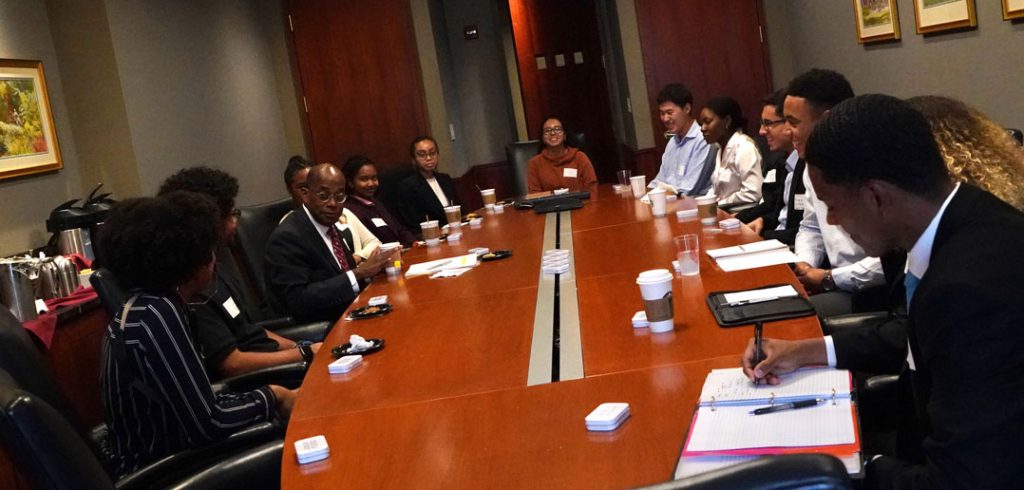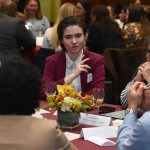
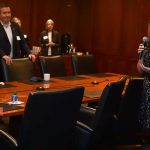
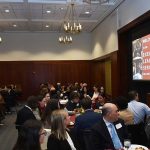
 More than 100 Fordham alumni and students gathered at the Lincoln Center campus on Nov. 16 for the annual President’s Council Executive Leadership Series Mentoring Event—an opportunity for young alumni and members of the council to share insights and advice with seniors and recent graduates from across Fordham’s undergraduate colleges. The event included a reception and roundtable discussions.
More than 100 Fordham alumni and students gathered at the Lincoln Center campus on Nov. 16 for the annual President’s Council Executive Leadership Series Mentoring Event—an opportunity for young alumni and members of the council to share insights and advice with seniors and recent graduates from across Fordham’s undergraduate colleges. The event included a reception and roundtable discussions.
Terry Begley, GABELLI ’86, the CEO of corporate banking at PNC Financial Services Group, kicked off the evening. He shared that as the new chair of the council, he’s excited to harness its passion for the University to help Fordham’s new president, Tania Tetlow, with “what she’s trying to accomplish.”
Fordham’s ‘Knights of the Round Table’
The reception served as the first official opportunity for Tetlow to meet the council, a group of successful professionals and philanthropists committed to mentoring Fordham’s future leaders, funding key initiatives, and raising the University’s profile.
“I am so excited to have my own council!” she told them at a reception prior to the mentoring event, which was held in the Lowenstein Center’s 12th-Floor Lounge. “I’ll think of you as Fordham’s Knights of the Round Table: You bring your wisdom, your contribution, your expertise—so much—to Fordham and our students.”
Tetlow said she loves hearing about the ways council members not only “help with the kind of donations that pay forward opportunity” but also engage with “our students quite directly—mentoring them, giving speeches, doing so much for the school.” She added that she’s “eager” to take in their advice and work with them to continue to enhance the Fordham experience for students.
Forge New Connections
Margot Reid, GABELLI ’21, special events and professional development chair of Fordham’s Young Alumni Committee, opened the roundtable discussion portion of the evening by welcoming alumni and parents “back here, back home, to Fordham.” She encouraged the students and recent graduates to really “make the most of this unique opportunity to connect with … the Fordham family” in the room, a group that included graduates from class years spanning five decades.
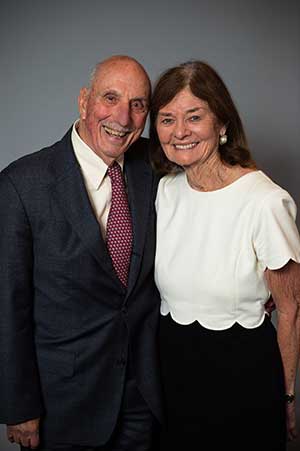
At 10 tables, each one featuring at least two mentors, attendees shared their stories—from what brought them to Fordham and who in the Fordham community has had the biggest impact on them to how to navigate the workforce while staying true to their values along the way. Guided by discussion prompts, they also delved into how Fordham’s global network of more than 200,000 alumni can help.
Garismar Ramirez, a Fordham College at Rose Hill senior studying neuroscience, asked the mentors at her table how they transitioned to the workforce after college, noting that she feels it would be a big jump to go from worrying about GPA and test scores to performing well every day on the job.
Thomas E. Kelly III, PAR ’11, ’13, said that he did it by learning to be comfortable with ambiguity and trusting in his ability to do a “good job.”
“Don’t be afraid. Don’t be anxious,” he said, adding they should aim to perform with as much excellence as they can.
Kelly, a member of the President’s Council, also encouraged students and recent graduates to use the resources Fordham offers, through the alumni relations office, the Career Center, and the Office of Counseling and Psychological Services, to help overcome any nervousness or anxiety they might have about interviewing and networking.
Trust the Process
Guthrie Garvin, FCRH ’99, a managing director at the real estate and investment firm JLL and member of the President’s Council, said that it’s important not to put too much pressure on yourself to find “the job” you’ll have for the rest of your life.
“I’ve been doing the same thing for 18 years, but it was a pretty circuitous path before that,” said Guthrie, who spent some time in education and sales before turning to real estate. “Find what you think you’re passionate about and jump in, but don’t be afraid to pivot if it turns out that there’s another path that seems more exciting. It’s part of the process.”
Speaking of process, Errol Pierre, GABELLI ’05, senior vice president of state programs at Healthfirst and member of the President’s Council, told the students that internships could help them determine what they’re most passionate about. Thanks to a series of three internships he completed as an undergraduate, he learned what he didn’t like. And “if you can align passion and profession, the sky’s the limit,” he said.
Remember You Belong
Halley Rodriguez, a Fordham College at Lincoln Center senior and a member of Fordham’s Collegiate Science and Technology Entry Program (CSTEP), said she was curious about how to combat imposter syndrome.
In response, Garvin encouraged each of the students at the table to “be confident in yourself and where you should be,” to resist the temptation to “run from what’s a little uncomfortable,” and to remember always that they will bring value to the organization that hires them.
“Constantly tell yourself, ‘I’m supposed to be here,’” Pierre said. “The time it takes to be in your head [worrying]takes you away from performing.”
]]>





 Graduating seniors in Fordham’s Collegiate Science and Technology Entry Program celebrated their accomplishments at the annual CSTEP Senior Farewell and Awards Ceremony on May 5.
Graduating seniors in Fordham’s Collegiate Science and Technology Entry Program celebrated their accomplishments at the annual CSTEP Senior Farewell and Awards Ceremony on May 5.
“You have achieved great things, and in the heart of the pandemic, you have managed to keep this community alive,” Joseph M. McShane, S.J., president of Fordham, said to the CSTEP students and staff. “This is a program that is a community. You all watch out for one another—and you inspire us.”
Fordham CSTEP is a statewide program that supports minority and economically disadvantaged students through mentorship and academic and career-oriented resources. The program prepares students for professions in areas where they are underrepresented, including STEM, health, and other licensed fields, and provides a “transformational, educational experience to future professionals and leaders,” said Renaldo D. Alba, associate director of the CSTEP and STEP programs.
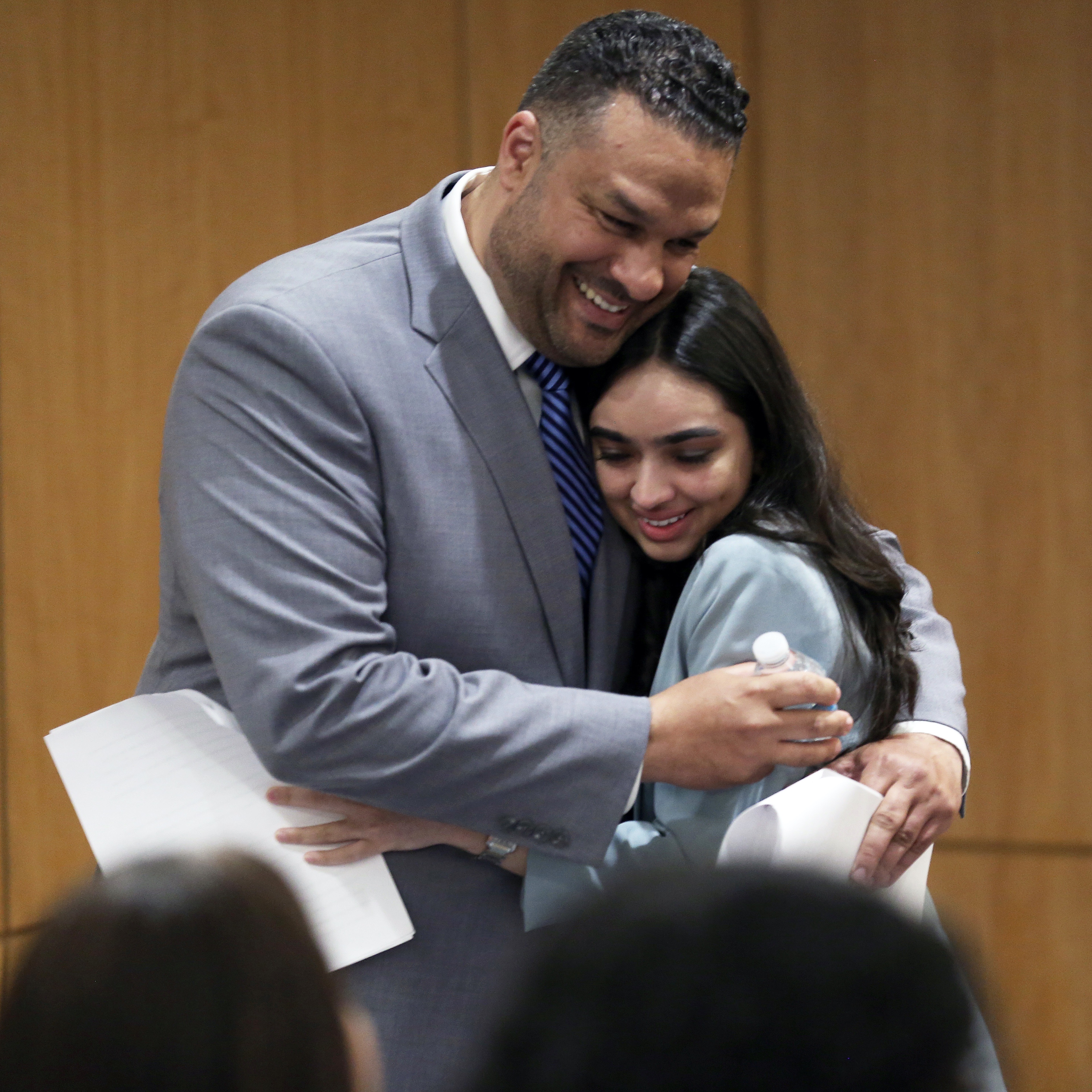
This spring, 73 CSTEP students will receive their diplomas, said Alba. After graduation, they will pursue different opportunities across the country. Among them are four students heading to dental, medical, or law school; one student attending a Ph.D. psychology program; 12 students pursuing master’s degrees in various disciplines; and one student participating in the City Year program, he said.
In addition to recognizing graduating seniors, the ceremony celebrated other CSTEP scholars, including more than 100 students who achieved a cumulative GPA of 3.5 or higher and about 50 students who served as tutors and peer counselors in the pre-college STEP Program for middle and high schoolers.
Rafael Zapata, chief diversity officer, special assistant to the president for diversity, and associate vice president for academic affairs, was recognized with CSTEP’s Outstanding Service Award, which is presented to faculty, administrators, and partners who have provided exceptional service to CSTEP students. In his acceptance speech, Zapata lauded Michael A. Molina, director of the CSTEP and STEP programs, for leading the program over the past 35 years. (Molina was unable to physically attend the event because he is recovering from a medical procedure, but he joined via Zoom.)
“No other office at Fordham better serves the needs of first-generation college students, low-income students, and students of color, with more dignity, understanding, love, support—and challenge—than CSTEP,” Zapata said.
Zapata, a native New Yorker who grew up in public housing and became the first in his family to graduate from college, said he wished he had a community like CSTEP when he was younger.
“I had a lot of loving and caring teachers. But I never had anyone who I could talk to about my life … I didn’t have this community. I wish I did,” Zapata said. “There’s so much pressure on you to sound differently, to act differently, to even walk differently. And for that, I’m grateful to remind you that I can be [myself], and you can be [yourself here].”
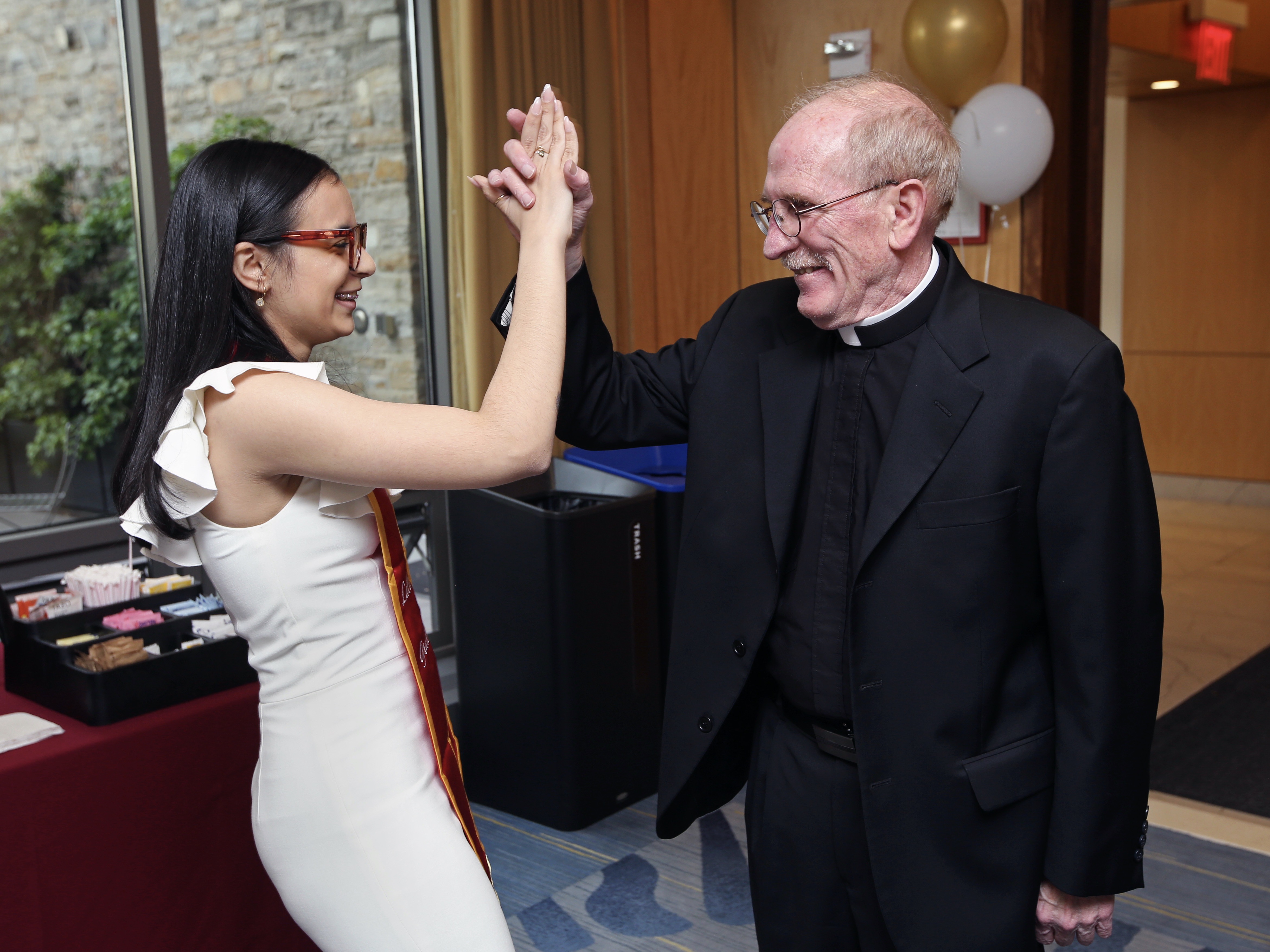
In heartfelt speeches, students described their own experiences in the program.
“CSTEP has been the best part of my undergrad experience and it has helped me grow socially, personally, and academically,” said Anusha Imran, FCLC ’22, a first-generation college student and aspiring physician who will receive CSTEP’s highest award at Fordham College at Lincoln Center’s award ceremony for graduating seniors. “I found a tight-knit community and met students who have similar stories, which only made me and them more resilient and fierce in the advocacy of our own education.”
In his keynote speech, CSTEP alumnus Braulio Carrero, FCRH ’04, senior counsel at Cityblock Health—a company that provides medical services to marginalized populations—congratulated the seniors and offered them advice for life after graduation.
“In my 20s, my purpose was trying to find my purpose,” Carrero said. “Some of you are very determined in the path that you want, and others aren’t. But at the end of the day … always remember what matters and why you’re doing what you’re doing.”
(Vincent Harris, FCRH ’22, who was scheduled to receive CSTEP’s highest award at Encaenia—Fordham College at Rose Hill’s award ceremony for graduating seniors—died suddenly on May 10. The University published an obituary and held a memorial Mass for Harris at the University Church at Rose Hill on May 13.)

The $2.5 million gift by Fordham alumna and former trustee Christina Seix Dow, TMC ’72, and her husband, Robert Dow, adds to the $2 million they gave nine years ago to establish their scholarship fund for CSTEP students. The new gift, announced in January 2021, comes in the midst of a Fordham fundraising campaign, Cura Personalis | For Every Fordham Student, that comprises four pillars including access and affordability. The gift is now producing an uptick in funding for students and, within a few years, could provide aid to nearly half of the students in the program, said its director, Michael A. Molina.
The fund has been a “godsend” for students, said Michael A. Molina, director of the CSTEP and STEP programs at Fordham. The additional gift is “really going to enable us to help a lot more students meet their financial need.”
In establishing the scholarship fund, the Dows were supporting students who remind them of themselves.
“My wife and I came from very little. For a long time, we’ve felt we’ve been fortunate, and it’s time to pay it forward or pay it back for students who may come from even more difficult situations than we had,” said Robert Dow, a former managing partner at Lord Abbett, an investment management company.
Support for the Underrepresented
CSTEP is a statewide program designed to support those who tend to be underrepresented in professions related to science, technology, engineering, and mathematics (STEM) as well as the the licensed professions, including health care.
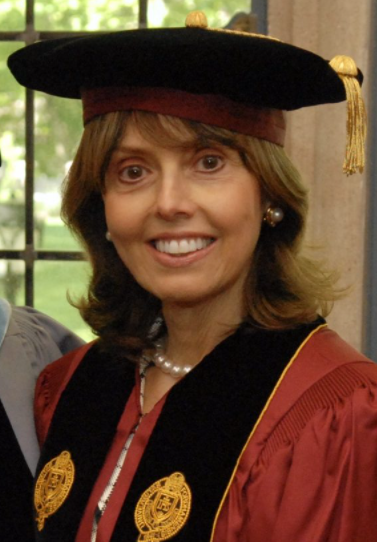
At Fordham, the students it serves tend to be Black, Latinx, first-generation, economically disadvantaged, and members of immigrant families living in the Bronx or its environs, Molina said. It has provided them with academic support, counseling, internships, scholarships, and research opportunities since 1987.
The original $2 million scholarship gift has helped 40 or 50 CSTEP students per year, providing sums ranging from a few hundred to a few thousand dollars that can make all the difference for families that have pulled together every last resource—grants, loans, scholarships—to meet their students’ costs, but who still need financial help, Molina said.
“Anything that we can help them with that helps tof ill in those gaps, that’s important,” he said. “If you come from an immigrant working class family … and you’ve got a $1,500 or $2,000 or $2,500 balance from your previous semester that you’ve got to take care of? That’s a lot of money for working class families,” he said.
With the new $2.5 million gift, the Dows’ scholarship fund could help nearly half of the approximately 270 students in the CSTEP program within a few years, Molina said.
Paying It Forward
The Christina Seix Dow College Science and Technology Entry Program Endowed Scholarship Fund is a need-based fund, with a GPA requirement, established to help CSTEP students stay at Fordham and graduate with less debt. “We hope that whatever they do, [the recipients are]they’re successful in life,” Robert Dow said. “And if they become successful financially, hopefully they’ll think about what gave them a start and pay it forward as well.”
Seix Dow has much in common with the CSTEP students she supports. She’s Puerto Rican, from the Bronx, and graduated with a bachelor’s degree in mathematics from Fordham. She was raised in a small apartment with limited resources, but, she has said, was surrounded by a loving family that developed her core values.
She became a multimillionaire bond manager, eventually forming her own investment management firm. She later founded the Christina Seix Academy, an independent school in New Jersey for underserved children. Seix Dow was among the first class of pioneering women in philanthropy at the inaugural Fordham Women’s Summit in 2017.
Preparing Students to Serve
The scholarships are a significant gift for the CSTEP students, many of whom are thousands of dollars in debt, said Renaldo D. Alba, associate director of the CSTEP and STEP programs. They not only help graduates leave Fordham in good financial health, but also prepare them to give back to their own communities.
“Our students often require graduate or professional school training, and at that level, there’s little to no financial aid. But if they’re in good [financial]health after graduation, they can take on additional loans at the next level. And if they do well and manage their loan debt as graduate students, they’re more likely to consider working in fields that may not be as lucrative in compensation, in communities that often don’t have the resources or money, because they don’t have to pay off these loans,” Alba said.
“A scholarship of this magnitude is so significant for students like these that are naturally inclined to stay in their community.”
Among the Seix Dow scholarship recipients is Leslie Abreu, a Dominican student from the Bronx who realized that Fordham was her “dream school” while attending the adjacent Fordham High School for the Arts, where she became class valedictorian.
“At one point, I was considering not going to my dream school because of finances,” said Abreu, who is enrolled in a five-year program to earn both a bachelor’s degree from Fordham College at Rose Hill and a Master of Science in Teaching from the Graduate School of Education. “Receiving help like that gives you reassurance that you are on the right path.”
Life hasn’t been easy for Abreu. Her father passed away in her senior year of high school, but he had encouraged his daughter to apply to Fordham. In her time at the University, she has advised two seventh graders in the Mentoring Latinas program, served as a peer counselor for pre-college students, and tutored middle and high school students in math as a tutor in CSTEP’s sibling STEP program for junior high and high school students. Someday, Abreu plans on following Seix Dow’s and her husband’s footsteps and paying it forward.
“[Seix Dow’s story] reassured me that that path is possible,” Abreu said. “And the fact that she has been able to help people like us shows me that I can also do that in the future.”
Learn more about Cura Personalis | For Every Fordham Student and make a gift.
If you have a question about giving to Fordham, call 212-636-6550 or send an email to [email protected].
]]>“When the pandemic first broke, we were able to pivot, keep the kids tuned in, and give them a sense of community and belonging,” said Michael A. Molina, director of Fordham’s STEP program. “I think that was extremely important and part of why we received this award.”
STEP is a state-funded program that helps minority and economically disadvantaged junior high and high school students prepare for professions in areas where they are underrepresented, especially STEM. Fordham spearheads two STEP programs—one at Rose Hill, the other at Lincoln Center—that collectively serve more than 500 students every year.
In typical years, STEP students receive academic counseling, internships, scholarships, and research opportunities both on and off campus. In addition to regular programming after school and during the summer, they have conducted research with professors at the Rose Hill campus and presented their findings alongside Fordham students at research symposiums. During the pandemic, they continued to learn and stay connected through reimagined ways of learning. In a virtual winter panel, successful Fordham alumni offered advice to STEP students. Last summer, a Fordham professor helped STEP students make connections between the civil rights movement and the Black Lives Matter movement; a University psychologist also offered guidance on how to understand racial trauma and identify strategies for self-care.
This fall, more STEP graduates than ever will be entering Fordham as first-year college students, said Molina.
“This is the largest contingent we’ve had since 1986, when we first started the program at Rose Hill,” said Molina, adding that the usual cohort is about five students, but this year, the number is 18. “And this is not an accident—this is something we’ve been working on for a long time. For the past five to 10 years, our team and the admissions office have been emphasizing to the STEP kids to consider coming to Fordham and joining CSTEP so we can continue to support them.”
CSTEP is similar to STEP, but the C stands for “collegiate.” The state program prepares undergraduate scholars from underrepresented groups for careers in STEM, health, and licensed fields. Fordham’s program is one of the largest in the state. This fall, Fordham CSTEP will resume in-person programming because students on campus are required to be vaccinated. But the STEP program, which serves local junior and high school students, will stay virtual until vaccinations are available and mandated for all children, said Molina.
“We’re going to continue doing what we’ve been doing: create a program that’s as interactive as possible with less lecturing and more of a hands-on approach with projects and faculty,” Molina said. “I’m optimistic. We have a lot of partners, great staff, and teachers who are creative.”
In a few weeks, Molina and his team will welcome to campus not only first-year students, but CSTEP sophomores who never stepped foot on campus during the pandemic when they were first-year students themselves. The CSTEP students, who served as virtual mentors to STEP students during the pandemic, will continue in that role, said Molina.
“One of the biggest things we’ll be focused on is building community with the kids. In-person relationship-building, the academic and non-academic relationships that students build with each other and us—all of that, we’re going to need to rebuild with the kids,” Molina said, referring both to STEP and CSTEP students. “We’re looking forward to having them back.”
]]>“I loved finance and economics. I tried to figure out a career [that used both]. I would not have been very good as a journalist or poet. I obviously am not going to be a great basketball player,” he said in Lowenstein’s Plaza View Room, to laughter from the students. “You’ve got to be true to yourself.”
Ferguson was raised in Washington, D.C., during the civil rights movement. His father served as a U.S. Army cartographer; his mother was a public school teacher. Ferguson started his education at a segregated elementary school and later won a scholarship to Sidwell Friends School, one of the top private schools in the nation. From there he was on to Harvard, and, later, embarked on a career path that took many twists and turns.
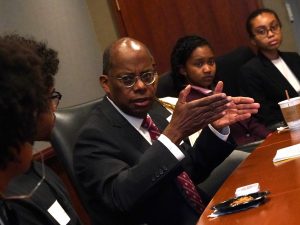
“Careers are not very predictable,” said Ferguson, who often speaks to students and meets with administrators at colleges and universities, which are a large portion of TIAA’s client base. “People often talk about a career ladder. The image is very clear, very straight[forward]… My experience is much more like a climbing wall. You move left, you move right. You try something that maybe you trained for and didn’t like—in my case, the law—but then you can figure out ways to go forward.”
Ferguson’s three degrees in economics—all from Harvard—carried him across the country. He worked as a lawyer, consultant, and leader at several different companies. Among them is the U.S. Federal Reserve, where he served as vice-chairman of the board of governors from 1999 to 2006—the first African American to do so. In 2008, he started his current role at TIAA, a Fortune 100 financial services company that has managed people’s savings for more than a century.
For almost an hour, he spoke with a small group of undergraduates, who hail from boroughs as close as the Bronx and states as far as California. Most of the students are in Fordham’s Collegiate Science and Technology Entry Program (CSTEP), which helps minority and economically disadvantaged students prepare for their careers.
The main theme of their discussion was diversity and inclusion. Prioritizing these things not only leads to better decision-making, said Ferguson—it’s also “the right thing to do, morally and ethically.”
“The phrase that we [TIAA] use around that is, ‘Diversity is being invited to the party. Inclusion is being invited and dancing on the dance floor with somebody,” he said.
Ferguson described the ways that TIAA has incorporated diversity and inclusion at home. In the 1980s, the company hired Clifton Wharton, the first African-American CEO of a Fortune 500 company. TIAA also has several employee resource groups—diverse organizations that provide professional development for employees. The association for LGBTQ+ professionals and their allies has helped conduct internal company training, said Ferguson. Meanwhile, the Latino and Hispanic network has improved TIAA’s ability to counsel in Spanish, he added.
“It allows diverse populations to find the place where they might feel a bit more at home, so to speak. But importantly, everyone is allowed to be a member of all our ERGs,” Ferguson said. “We don’t want them to be isolated.”
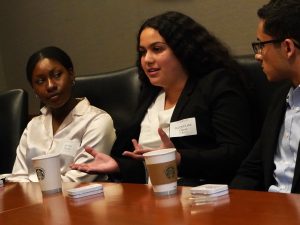
In a Q&A session, students asked Ferguson about the challenges of being the first person of color in a high-level position and how TIAA is teaching young people about financial literacy. They also talked about microaggressions, including the ones that Ferguson has personally faced. He said it’s often difficult for him to catch an uptown cab in New York City. He also recalled the time he dined at a “fancy” restaurant and the waiter gave the check to the white person at his table—but Ferguson was the one paying the tab.
“That kind of stuff does happen all the time,” Ferguson said. “But again, I can’t let somebody else’s foolishness demean my own sense of worth and self-confidence.”
Hector Bonilla, a Fordham College at Lincoln Center senior studying economics, asked Ferguson about how difficult it is to find and hire candidates of color. Ferguson recalled a person who once asked him, “What do you say to a CEO who says, ‘I can’t find a woman qualified to be on my board?’”
His answer was short but simple: “You’re not looking hard enough.”
In his last comments to the students, Ferguson advised them to finish their education at Fordham, take “reasonable” risks in their careers, and leverage their natural strengths. He also reminded them of what diversity and inclusion are all about.
“Ultimately,” he said, “it’s about being very respectful of human beings.”
]]>“I was reading the textbooks straight through in order to do well, making lists of what to finish and crossing things off when they were done,” said Baig, now a sophomore at Fordham College at Rose Hill. “It seemed organized, but did I actually understand it?”
When it took her two full days to read seven chapters for a biology test, it became clear to Baig she needed to either cut back, or regroup and seek help on how to achieve her ambitions.
Seeking A Path Forward
Through Fordham’s Collegiate Science and Technology Entry Program (CSTEP) office, Baig was introduced to Julia Escobar, then a Gabelli School junior, as someone who might be able to offer advice. Like her, Escobar was focused on completing a pre-health concentration with a major in business. When facing her own workload worries, Escobar had heard the “cut back your course load” suggestions from counselors. But she wasn’t compromising, and she advised Baig to stick to her dream, too.
“Julia took me in and said, ‘This is what it is going to be like,’” recalls Baig. “She told me, ‘Don’t let people put you down and say you can’t do it, because it definitely can get done.’ She gave me a 4-year plan on an Excel chart of how everything would go.”
And that, says Baig, was all in their first meeting. “She didn’t even know who I was!”
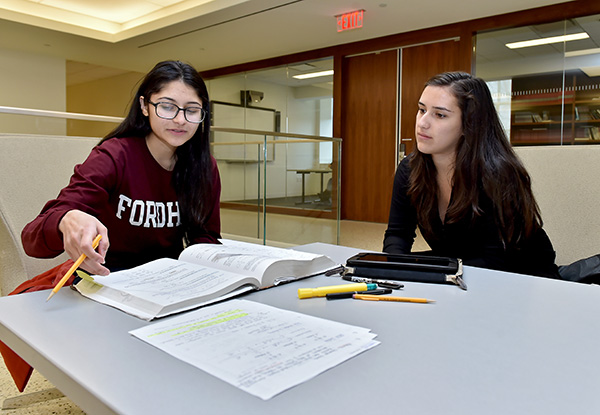
Over the next few months, Escobar helped guide Baig on what programs to apply for in the summer, how to get recommendation letters, and even what classes she should take and what clubs to join.
“Ultimately, I was her peer-peer resource, giving her all my knowledge so she could have a more seamless college experience,” said Escobar.
Fast forward one year, and Baig and Escobar speak gratefully of their mentor-mentee relationship and the successes it has brought them both. While the C-STEP Summer Scholars experience gave them a bit of common ground amid a student population of 15,000, staying friends has been a matter of mutual respect and admiration, the students say.
“Julia had done everything I was trying to do,” said Baig. “And she understands in a different manner than the counselors. She sees things from the perspective of a student who has walked the same path.”
From One Student to Another
You could say the importance of student-to-student support at a university is exemplified through Baig and Escobar’s story. Both were standouts at their high schools who struggled upon reaching college. Baig was a native of the Bronx who attended the Manhattan Center for Science and Math in Spanish Harlem; Escobar attended a large suburban public high school in Arvada, Colorado.
“I was valedictorian, and it was no big deal,” said Escobar. “I didn’t study much. So I come here (to Fordham) and it was like, ‘oh wow, this is tough.’ In my first semester biology, I was getting D’s across the board.”
Not one to be told she can’t achieve, Escobar took the matter into her own hands and sought out ways to raise her performance. With an app called Quizlet, she began to concentrate on trying out the scientific concepts through problems rather than reading through the material, a strategy she also passed on to Baig.
That and other strategies have worked for them both, academically. Escobar is graduating with a 3.76, and Baig’s biology scores, which she says had been in the 80s, moved into the 90s when she began to incorporate Escobar’s suggestions. She has a 3.6 overall presently.
This is not to say that it’s easy, by any means, the students emphasize. Escobar and Baig both carry heavy credit loads: Escobar, to complete a double major at the Gabelli School, has averaged 20 credits a semester; Baig has averaged 18 to 20 per semester in her combination pre-health and economics coursework at Fordham College at Rose Hill.
More important than academics has been building peer networks, said Escobar. She, too, has sought support from other students who are pursuing an equally rigorous academic schedule. As a junior, she co-founded the Business Innovations in Healthcare Club (BHIC), which consists of students engaged in any kind of business and pre-health curriculum. Escobar got Baig involved, and next semester Baig will serve on their executive board.
“We are the total nontraditionals in the Gabelli School,” said Escobar of the BHIC students. “On the business side, many students don’t understand that there are not just financial services at banks; there are also financial services at hospitals. Healthcare business administration is one of those things that is completely overlooked and that is not the sexiest of professions, but is a great profession.”
The admiration that has developed between the two women has enhanced both of their college experiences, they said. On a recent weekend, Escobar took Baig along with her to “Impressions Day” at Columbia College of Dental Medicine, which she will be attending next year after she graduates on May 21. She wanted to give Baig the chance to see if she might have an interest in dentistry.
She describes Baig as “sweet and kindhearted” in a way that she says has helped her be a more conscientious person.
And Baig says she is inspired by Escobar’s energy, generosity, and willingness to help in ways that only another student could.
“I’ve had a lot of support from adults,” said Baig, “but I feel like when it comes from a student it’s more of a practical situation.”
]]>